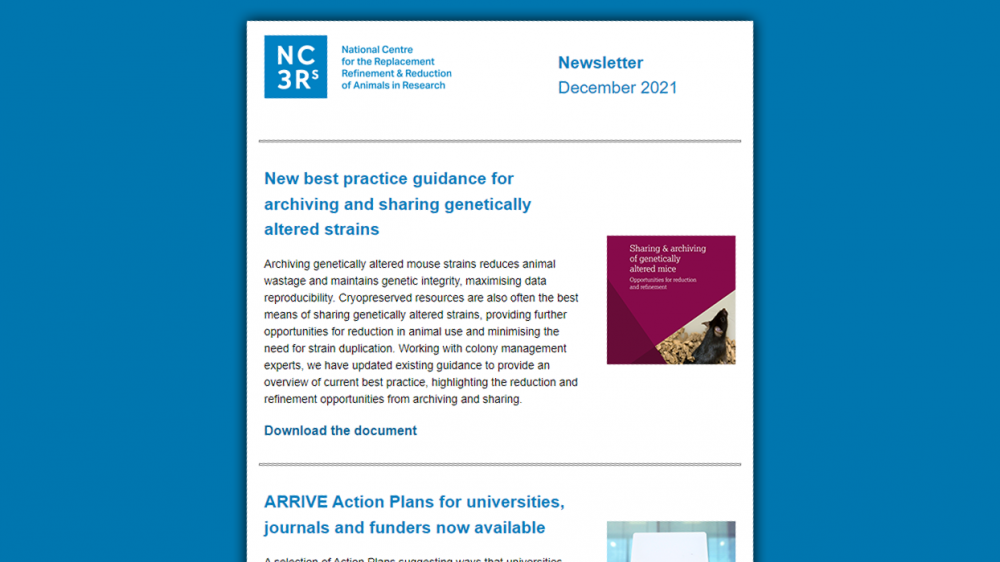Latest news from the NC3Rs: June 2024
In this issue
- Practical support for refined mouse handling
- User test new in vitro reporting standards
- Apply now: £4M available for non-animal methods infrastructure grants
- Apply now: £1M available for non-animal derived product validation grants
- Applications open soon: Partnerships and Impact awards
- Recording available: Machine-learning aided multiscale modelling framework for toxicological endpoint predictions in the dog
- Virtual workshop: Using the Experimental Design Assistant
- EUROTOX satellite workshop: Dose level selection for DART studies
- Summer school on systematic reviews
- Galleria mellonella workshop 2024
Practical support for refined mouse handling
We are supporting the delivery of in-person workshops on refined mouse handling to UK facilities. This free, half-day workshop is suitable for all animal facility staff, new PIL holders and early career researchers and will be delivered by animal technicians from Newcastle University.
Places are limited, contact us for more information: tech3Rs@nc3rs.org.uk.
User test new in vitro reporting standards
Researchers who are drafting a manuscript for publication that includes in vitro models are invited to take part in user testing for new minimum reporting standards. RIVER (Reporting In Vitro Experiments Responsibly) is a set of six recommendations for reporting in vitro experiments to ensure that manuscripts include the information necessary for a reader to assess the methodological rigour and reliability of the study.
Submit your draft manuscript (at least methods and results for one experiment) by Wednesday 28 August.
Contact: river@nc3rs.org.uk.
Apply now: £4M available for non-animal methods infrastructure grants
Our new infrastructure grants aim to accelerate the uptake of non-animal methods to replace the use of animals in scientific procedures. The funding is exclusively for non-research proposals that will increase the capacity and capabilities of the UK research base to use non-animal methods.
Multidisciplinary, cross-institutional, cross-departmental or cross-sector applications are of particular interest and proposals with an industrial partner are strongly encouraged.
Awards will be made for spending in the 2024/25 financial year. The maximum amount that can be requested is dependent on the need of the project. Equipment only grants should not exceed £500k.
Apply now: £1M available for non-animal derived product validation grants
New funding is available for projects aiming to characterise and validate the use of non-animal derived reagents and products for in vitro research. Areas within scope include:
- Comparison studies with animal-based products.
- Characterisation studies to demonstrate important features.
- Performance studies to determine product functionality.
- Optimisation studies to improve product utility.
- Reproducibility studies to show that the product produces reliable and replicable findings.
Awards will be made for spending in the 2024/25 financial year.
Applications open soon: Partnerships and Impact awards
Partnerships and Impact awards support researchers to work together to test and transfer 3Rs approaches between labs, accelerating the uptake of new approaches and achieving wider 3Rs impacts.
Applications can include studies to build the evidence base for a 3Rs approach, demonstrate transferability or apply a model to a new discipline. Studies demonstrating that an approach is fit-for-purpose in a new lab or organisation are encouraged to build further confidence in the model’s use.
Additional joint awards with Cancer Research UK and BHF are available for grants seeking to achieve a 3Rs impact within cancer or cardiovascular research fields. Additional eligibility criteria apply.
- Watch the launch webinar.
- Register for our next webinar, Tuesday 9 July 14.00 – 15.00
Writing a competitive Partnerships and Impact award application.
Recording available: Machine-learning aided multiscale modelling framework for toxicological endpoint predictions in the dog
This webinar, co-hosted by the NC3Rs and the Health and Environmental Sciences Institute, showcases the ‘Virtual Second Species’ project. Supported through our CRACK IT Challenges innovation programme, the aim is to exploit advances in computational approaches and machine learning to develop a 'Virtual Dog' to ultimately replace their use for chronic toxicity studies.
Virtual workshop: Using the Experimental Design Assistant
Thursday 18 July, 16.00 – 18.00 (BST)
Our Experimental Design Assistant (EDA) tool helps researchers at any level design robust in vivo experiments. During this interactive session Dr Esther Pearl (NC3Rs Programme Manager for Experimental Design) will give a live demonstration of the EDA before answering your questions and providing personalised feedback as you design your own experiment.
EUROTOX satellite workshop: Dose level selection for DART studies
Wednesday 11 September
Copenhagen, Denmark
We are participating in a satellite workshop session at EUROTOX 2024, focusing on dose level selection for Developmental and Reproductive Toxicology (DART) studies. Dr Fiona Sewell (NC3Rs Head of Toxicology) will take part alongside representative from Charles River Laboratories and the European Chemicals Agency.
Summer school on systematic reviews
Tuesday 20 August – Friday 23 August
Bergen, Norway
Organised by Norecopa and the University of Bergen and led by experts in systematic reviews from the University of Zurich, this summer school will explore the benefits of systematic reviews of animal studies and cover all the steps needed to perform a systematic review. Early career researchers will be given priority for registration.
Galleria mellonella workshop 2024
Friday 23 August
Brunel University London
Scientists using wax moth larvae in their research are invited to the third annual Galleria mellonella workshop for networking and discussion of methods, models and husbandry techniques. Travel awards are available with priority given to participants delivering a talk. Organised by NC3Rs-funded PhD student Evgenia Maslova in the McCarthy lab at Brunel University London, in collaboration with the Galleria Mellonella Research Centre.
Create a website account to subscribe and get the latest articles, events and funding opportunities from the NC3Rs in your email inbox every month.

